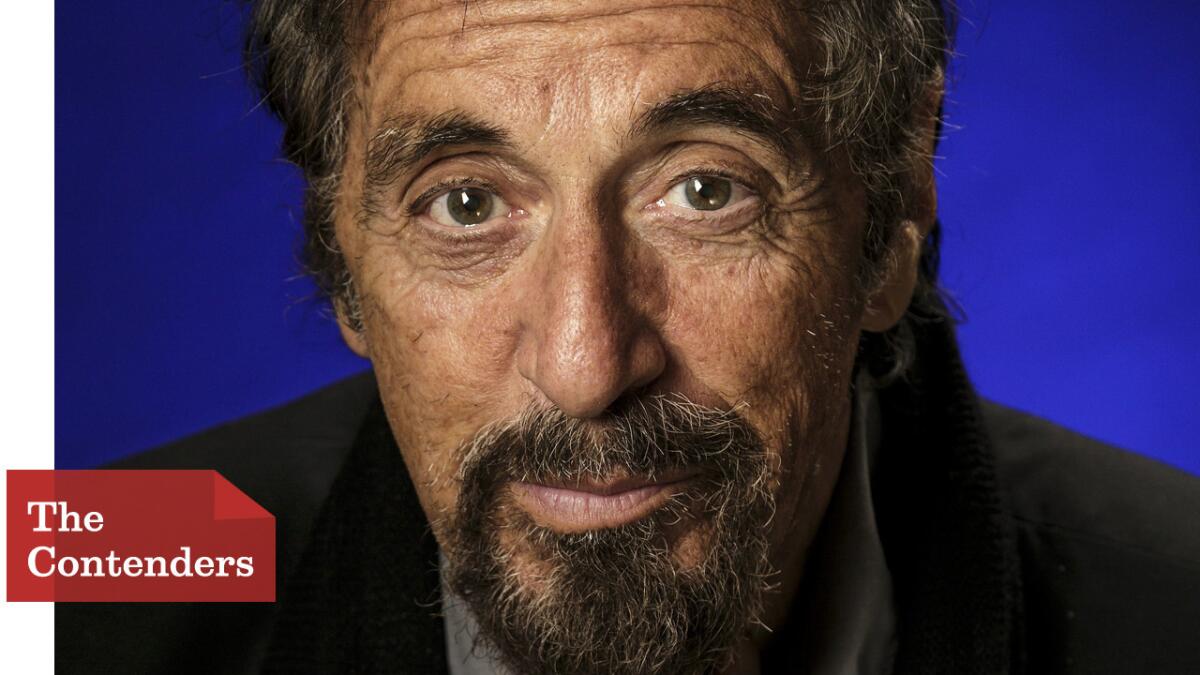The Envelope: Al Pacino faces actors’ nightmares in Philip Roth’s ‘The Humbling’

- Share via
On the shaded porch of his Beverly Hills home, Al Pacino is bright-eyed and upbeat, eager to talk about his career, his latest film and even his life in L.A. The 74-year-old actor waves toward the sidewalk in front of his house and takes in how far he’s come since beginning his life and career in New York: “Just hearing the footsteps is fun for me because I’m a city boy, and, naturally, there’s just no people out here most of the time. Occasionally, a neighbor walks by and waves. It’s fine.”
The Oscar winner’s latest film is “The Humbling,” based on Philip Roth’s last novel, depicting the life and work of noted actor Simon Axler (Pacino) as he loses control of his world on-stage and off.
“The Humbling,” directed by Barry Levinson (“Wag the Dog,” “Diner”) with a script by Buck Henry (“The Graduate”), will be released Jan. 23 after an Oscar-qualifying run in December. The film gives Pacino the opportunity — and the challenge — of facing several actors’ nightmares.
You acquired this book to film it, but it’s full of tough stuff — the actor’s nightmare of forgetting lines, the human nightmare of loss of mental faculty. What made this something you had to make?
I guess it’s a part of where you’re at, at the time in your life, especially when you’re doing movies. There’s something about the movie that’s both unforgiving and forgiving at the same time. I thought, reading this book, that there’s something there that would be appropriate for me to play. There’s my wheelhouse: an actor, getting older, in the theater, mainly in the theater. When I think of it, in retrospect, I think there was something about an actor feeling as though he wanted to be a human being, and I don’t know why it made me chuckle.
The great Philip Roth, and I call him that because he’s the greatest, for me, American novelist — he’s thinking about an actor losing his talent. Well, that is not quite what an actor goes through. Both Buck Henry and Barry Levinson and I got together a few times, talked. I think what we came up with, the spin being humorous, there’s some fun here.
There is an Italian proverb that “the translator is a traitor.” The question is, are there books that are improved by a little treason? By altering them for the screen?
Let’s hope so. I don’t want you to think me presumptuous and say we’ve improved on Philip Roth, but it’s true that [filming] will change the book. It has to. I think “The Godfather” was faithful to the book, because we had Mario Puzo there.
There are moments of real feeling and emotion here, but on a 20-day shoot, how hard do you have to work to get those moments?
Here’s where I think we got lucky, because Barry did some of the scenes close by. We found the locations [including Levinson’s Connecticut home], but we did it in increments, which I sort of believe in. I’ve done a few little experimental films like that. Most of them didn’t see the light of day, but that’s how I shot and worked on these things, and I found that it feeds you. I don’t think all films should be done like that, usually, but when you’re involved in stuff that you feel you know fairly well, I think you can do that.
There’s another great actor’s nightmare in it, where a character keeps saying to yours, “You were in that movie, the one with the tarantulas,” which is not true. Do even you get that?
The only thing that I would say comes close to that is being called either Robert De Niro or Dustin Hoffman. “Hi, Dustin,” or “Hi, Robert.” “Hi, Bob.” They get the same thing; it’s those three actors coming out of the ‘70s. We’re all part of that thing, and I think sometimes that gets confusing. Less and less, I have to say. Less and less, mercifully.
There is so much of “King Lear” in this movie, but the classic line, for me, from “Lear,” is when he rages, “I am a man more sinned against than sinning,” and I’m wondering if you see Simon as a man more sinning than sinned against.
I think he would be more sinning, but there is a part of Simon that I hope comes through — he says it clearly, in a way, when he says that when he was 9, he was acting on-stage. He used it, in a way, as the star that you follow. The relief it gives you. Simon obviously didn’t have the best or most supportive of an upbringing, and yet he went to acting. You’re in a desert, and there it is: You’ve found water.
More to Read
Sign up for The Envelope
Get exclusive awards season news, in-depth interviews and columnist Glenn Whipp’s must-read analysis straight to your inbox.
You may occasionally receive promotional content from the Los Angeles Times.






